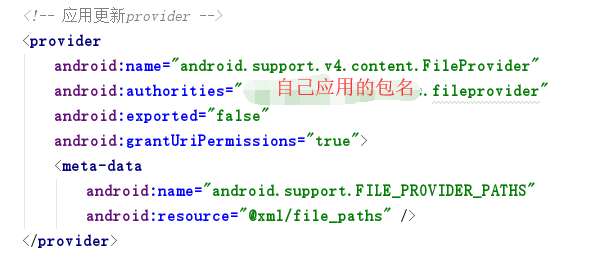Android 7.0以上的版本更新采用系统自带的DownloadManager更新
DOWNLOADPATH ="/download/"
https://www.jianshu.com/p/55eae30d133c
<external-path name="name" path="path" />
物理路径相当于Environment.getExternalStorageDirectory() + /path/。
<external-files-path name="name" path="path" />
<external-files-path name="name" path="path" />
物理路径相当于**Context.getExternalFilesDir(String) **+ /path/。
https://www.cnblogs.com/fengfenghuifei/p/9870143.html
这个博主的原文
Manifest里声明provider ,xml设置文件目录,代码里获取uri,intent里设置uri,然后使用 我这里要说的是我们如何设置二级目录 因为xml里各种path的构建只允许出现一级目录的如 TestAPKPath,这样的 不允许出现TestAPKPath/Img这样 所以方法就是在构建文件的时候,在文件的目录上写上二级域名 File file = new File(“xxxx/TestApkPath/Img”); Uri uri = FileProvider.getUri("xxx.xxx.provider",file); 这样我们就完成了将file存储到二级目录的效果
我这里遇到的问题就是,之前将更新apk包下载到了/jingyeapp/downloadApk 文件夹下了,但是在xml配置时,添加二级目录,就会合并在一块,出现解析失败的问题。
上面博客的方法,自己未测试。直接修改了新apk包的下载路径到手机系统的/download/文件夹下。
private void initDownManager() { LogUtil.d(TAG, "initDownManager"); manager = (DownloadManager) getSystemService(DOWNLOAD_SERVICE); receiver = new DownloadCompleteReceiver(); //设置下载地址 DownloadManager.Request down = new DownloadManager.Request(Uri.parse(url)); // 设置允许使用的网络类型,这里是移动网络和wifi都可以 down.setAllowedNetworkTypes(DownloadManager.Request.NETWORK_MOBILE | DownloadManager.Request.NETWORK_WIFI); down.setAllowedOverRoaming(false); MimeTypeMap mimeTypeMap = MimeTypeMap.getSingleton(); String mimeString = mimeTypeMap.getMimeTypeFromExtension(MimeTypeMap.getFileExtensionFromUrl(url)); down.setMimeType(mimeString); // 下载时,通知栏显示途中 down.setNotificationVisibility(DownloadManager.Request.VISIBILITY_VISIBLE); // 显示下载界面 down.setVisibleInDownloadsUi(true); // 设置下载后文件存放的位置 down.setDestinationInExternalPublicDir(DOWNLOADPATH, "jingye.apk"); down.setTitle("敬业升级"); // 将下载请求放入队列 manager.enqueue(down); //注册下载广播 registerReceiver(receiver, new IntentFilter(DownloadManager.ACTION_DOWNLOAD_COMPLETE)); } public int onStartCommand(Intent intent, int flags, int startId) { LogUtil.d(TAG, "onStartCommand"); url = intent.getStringExtra("downloadurl"); String path = Environment.getExternalStorageDirectory().getAbsolutePath() + DOWNLOADPATH + "jingye.apk"; File file = new File(path); if (file.exists()) { file.delete(); } try { // 调用下载 initDownManager(); Toast.makeText(getApplicationContext(), "升级中,可以在通知栏查看进度", Toast.LENGTH_SHORT).show(); } catch (Exception e) { e.printStackTrace(); Toast.makeText(getApplicationContext(), "下载失败", Toast.LENGTH_SHORT).show(); } return Service.START_NOT_STICKY; }
public void install(Context context) { File file = new File(Environment.getExternalStoragePublicDirectory(Environment.DIRECTORY_DOWNLOADS) ,"jingye.apk"); Intent intent = new Intent(Intent.ACTION_VIEW); //参数1 上下文, 参数2 Provider主机地址 和配置文件中保持一致 参数3 共享的文件 Uri apkUri = FileProvider.getUriForFile(context, BuildConfig.APPLICATION_ID+".fileprovider",file); intent.addCategory("android.intent.category.DEFAULT"); // 由于没有在Activity环境下启动Activity,设置下面的标签 intent.setFlags(Intent.FLAG_ACTIVITY_NEW_TASK); //添加这一句表示对目标应用临时授权该Uri所代表的文件 intent.addFlags(Intent.FLAG_GRANT_READ_URI_PERMISSION); intent.setDataAndType(apkUri, "application/vnd.android.package-archive"); LogUtil.d(TAG, "install -apkUri:"+apkUri); context.startActivity(intent); }


第一开始,更新时,总提示:安装包解析失败,发现路径跟期望设置的不同。

正确的路径




